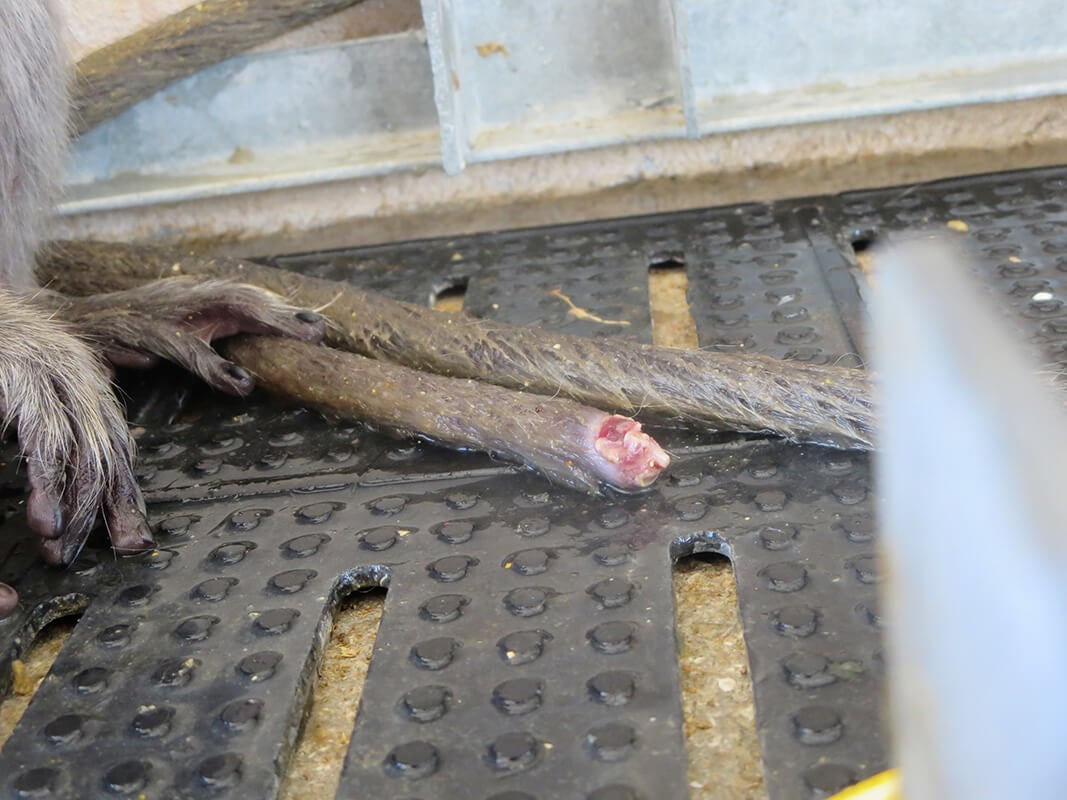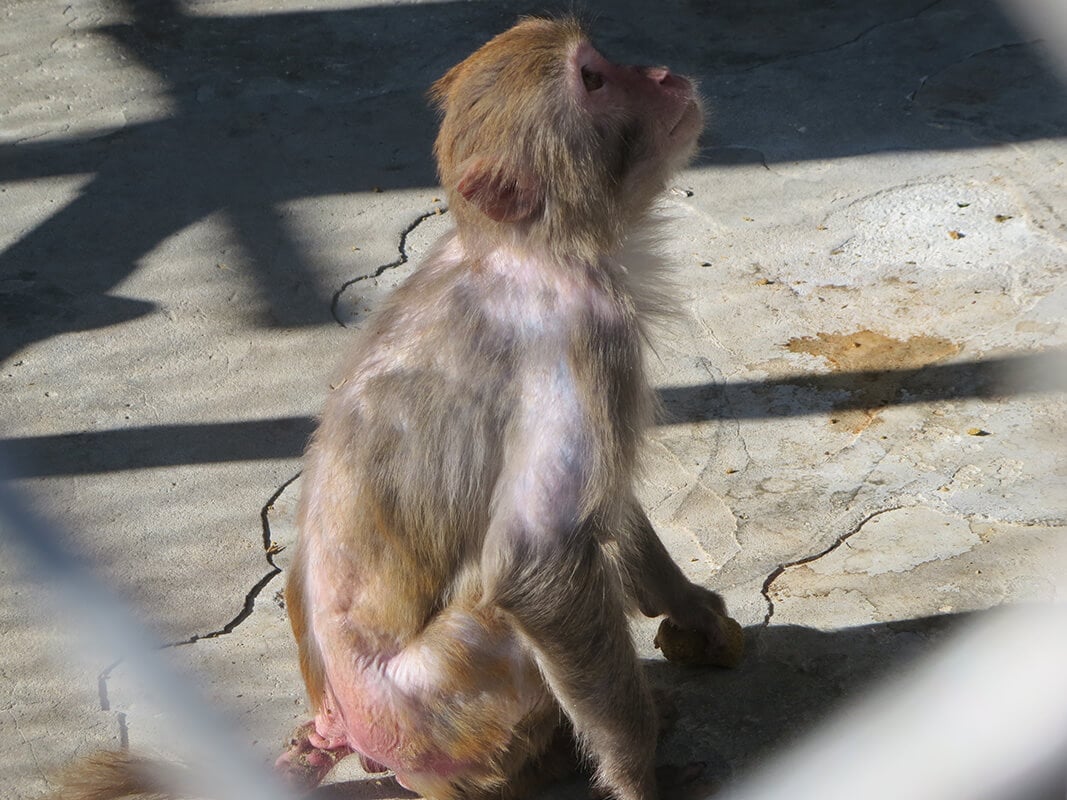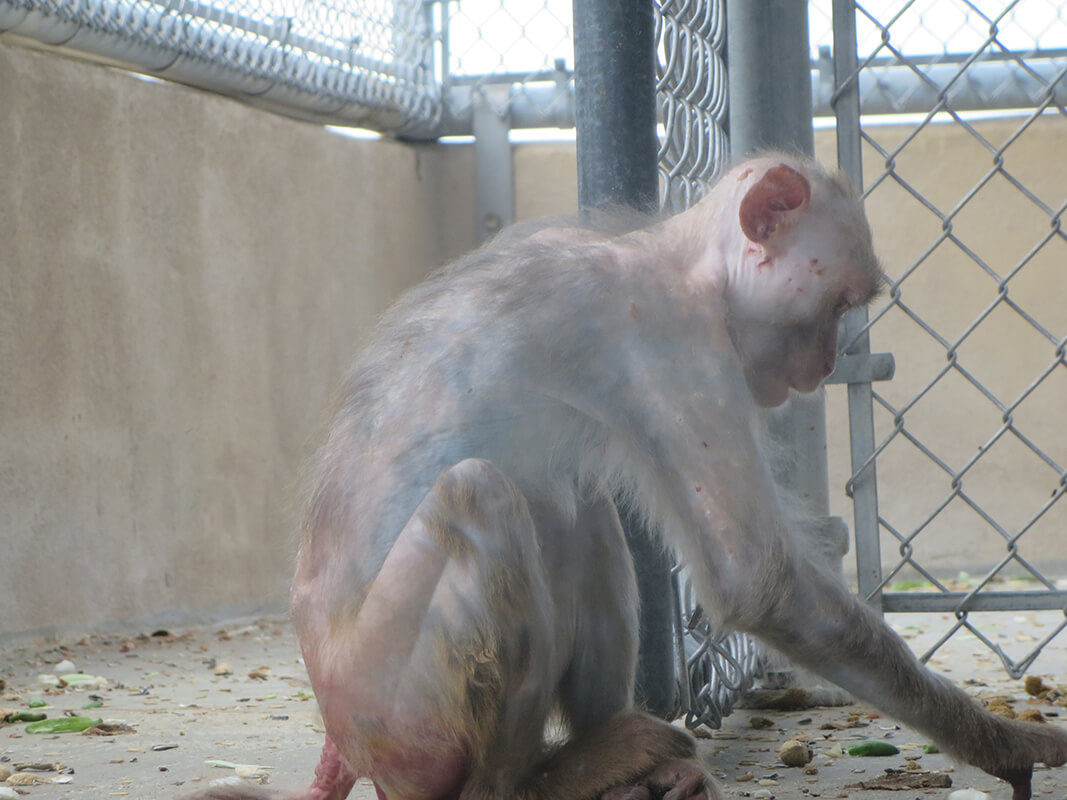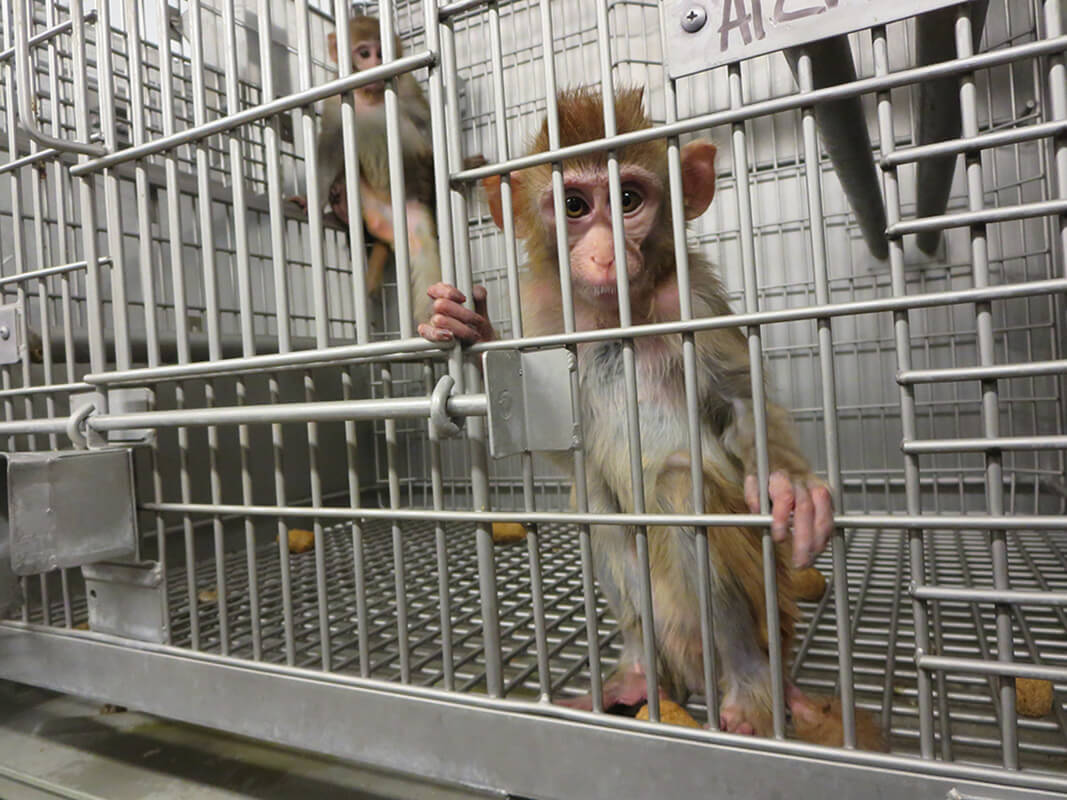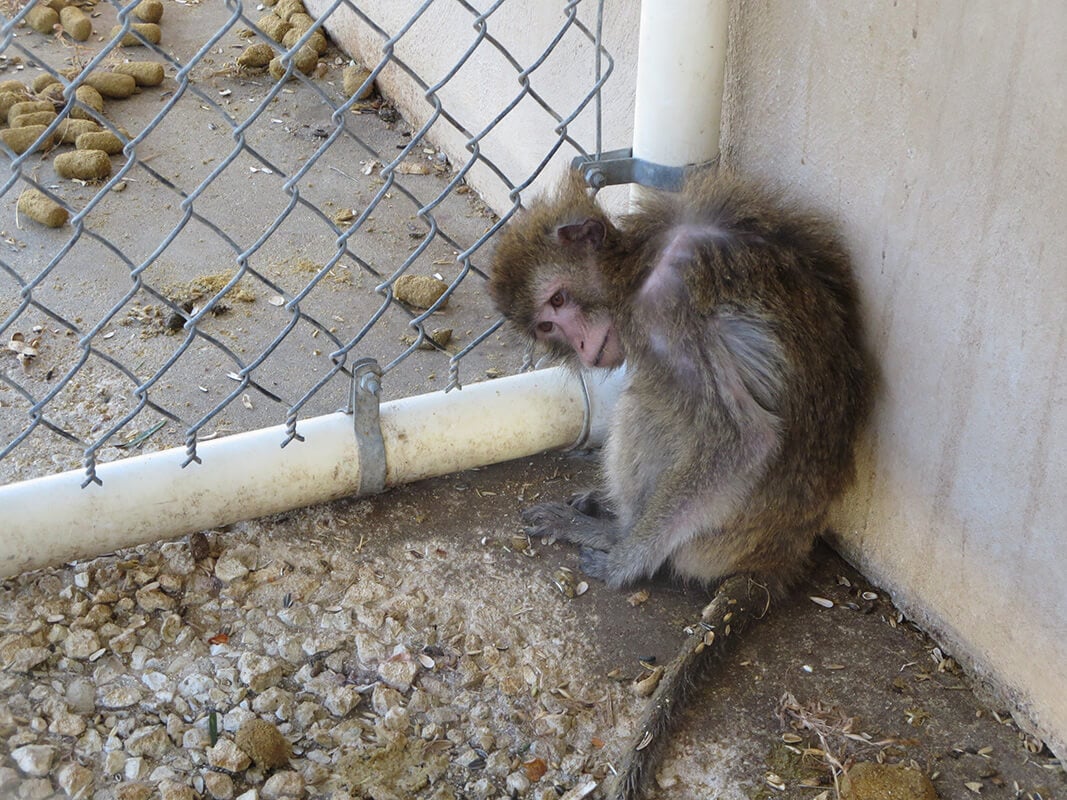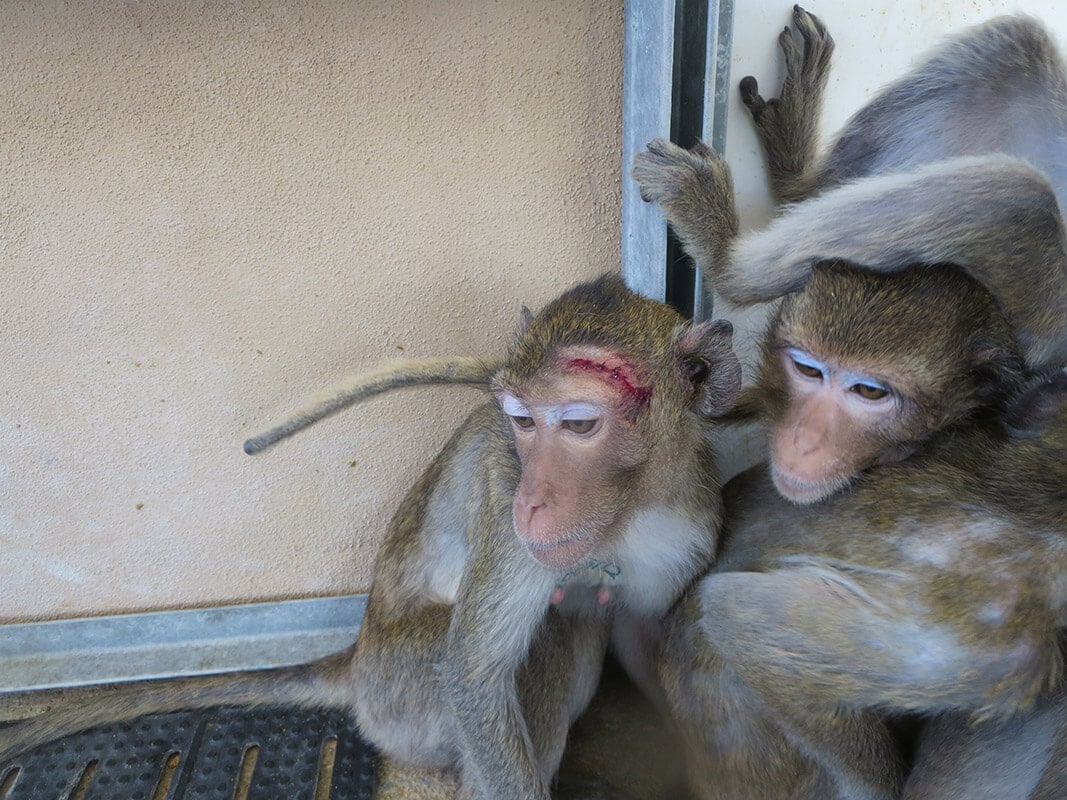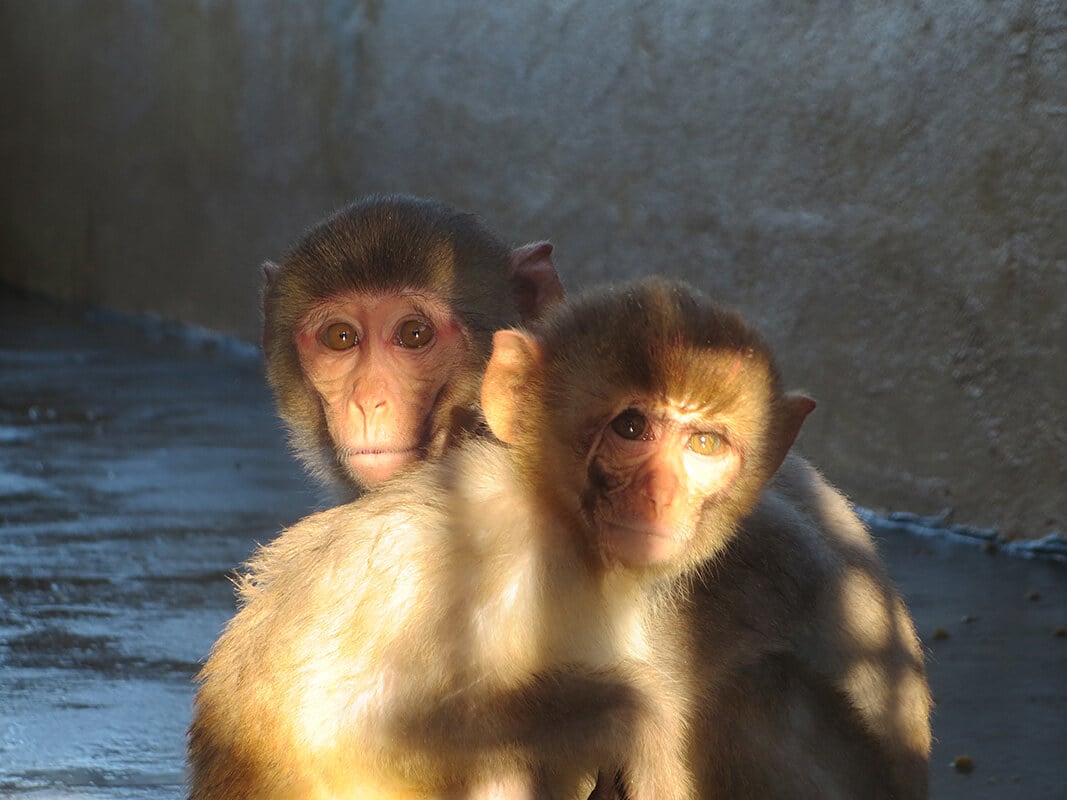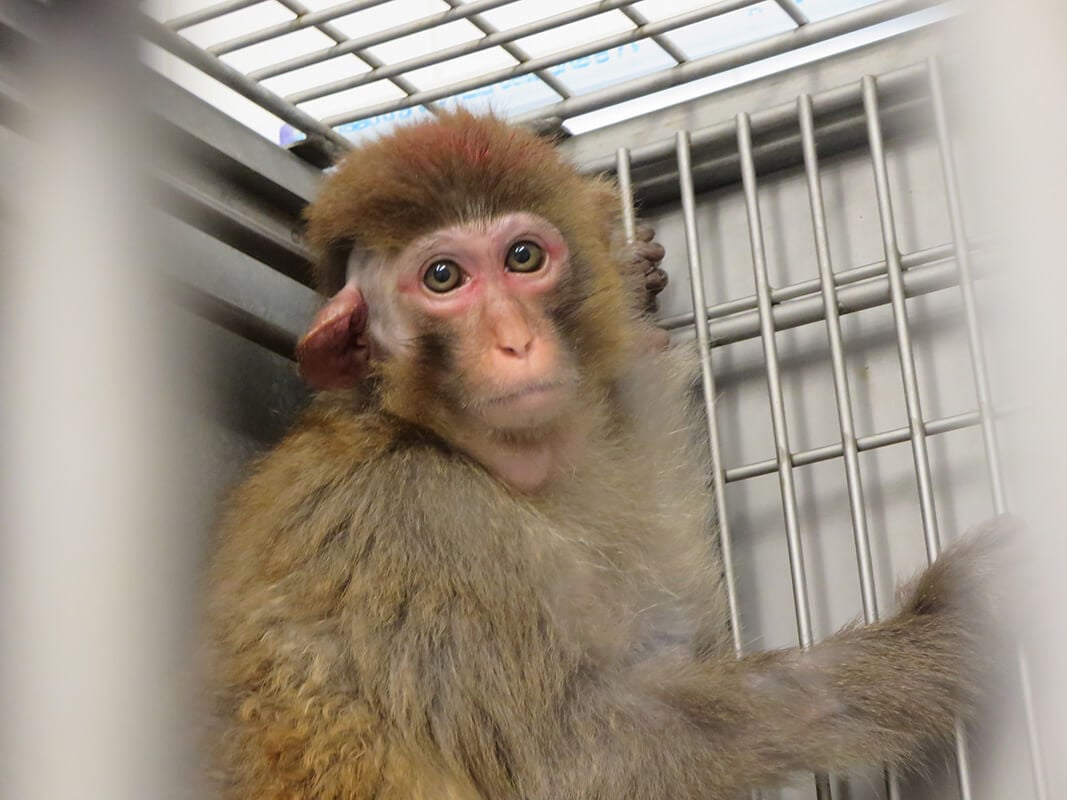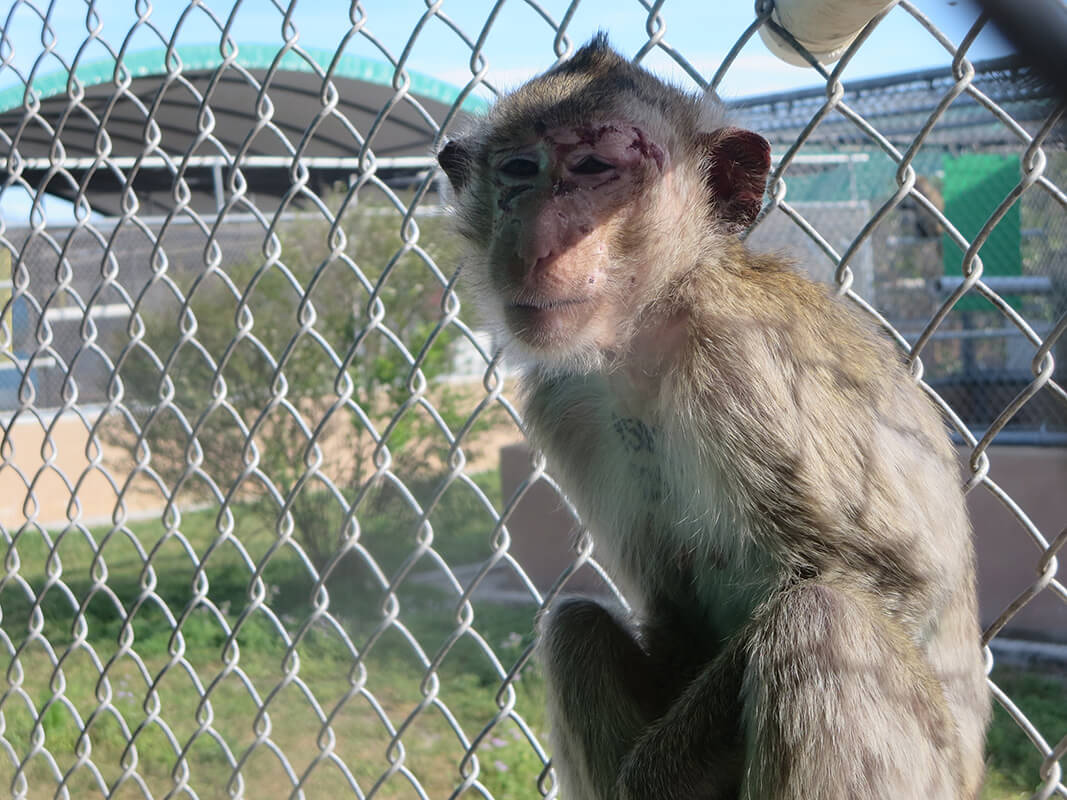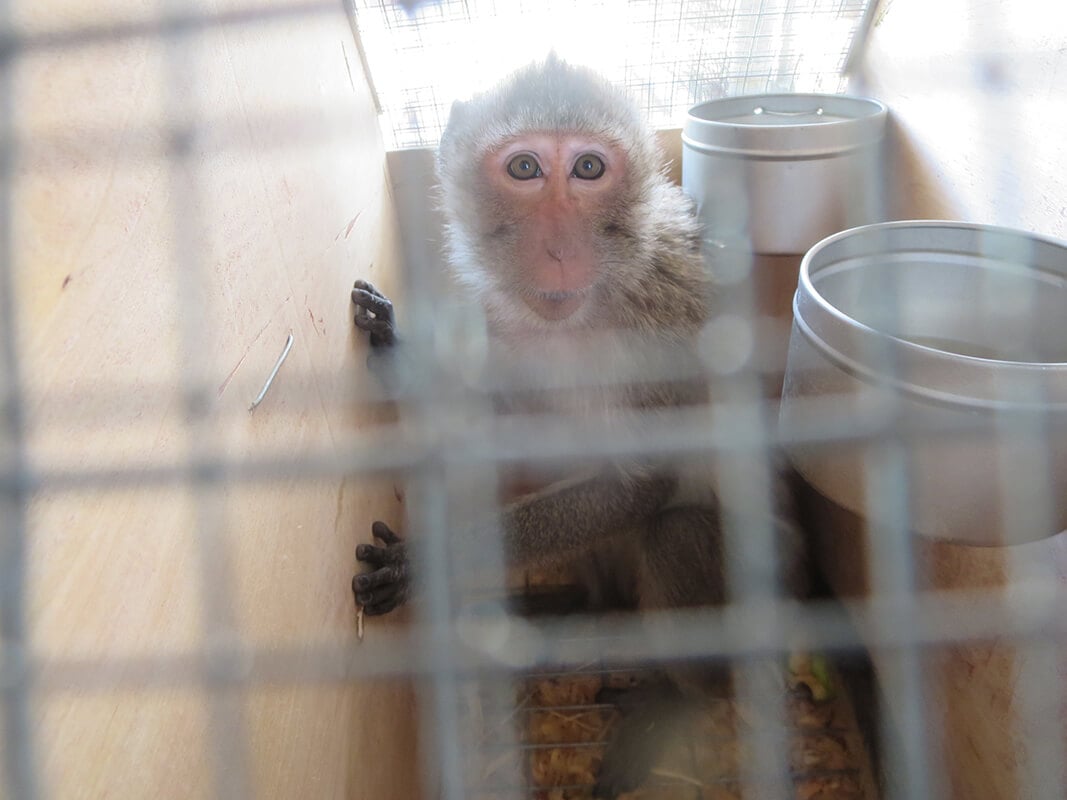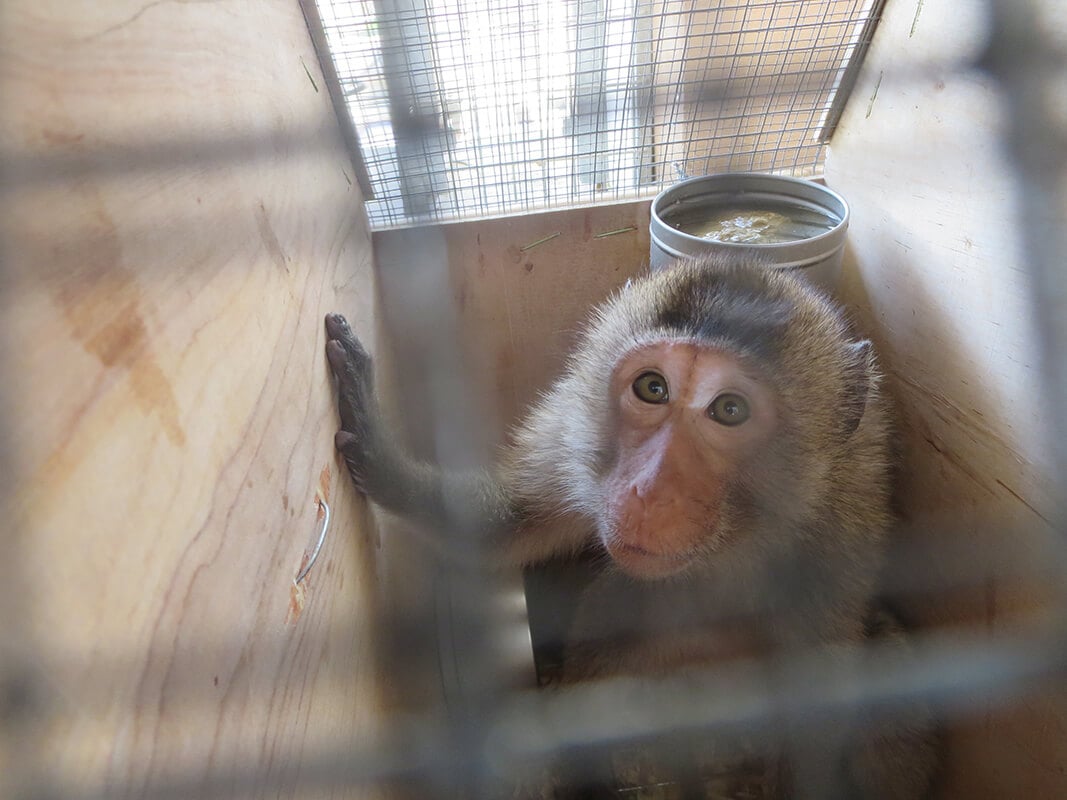Eyewitness Exposé: Pain, Fear, and Death at Primate Products, Inc.
You’ve never seen anything like this before—and much of it is being paid for by U.S. taxpayers’ dollars!
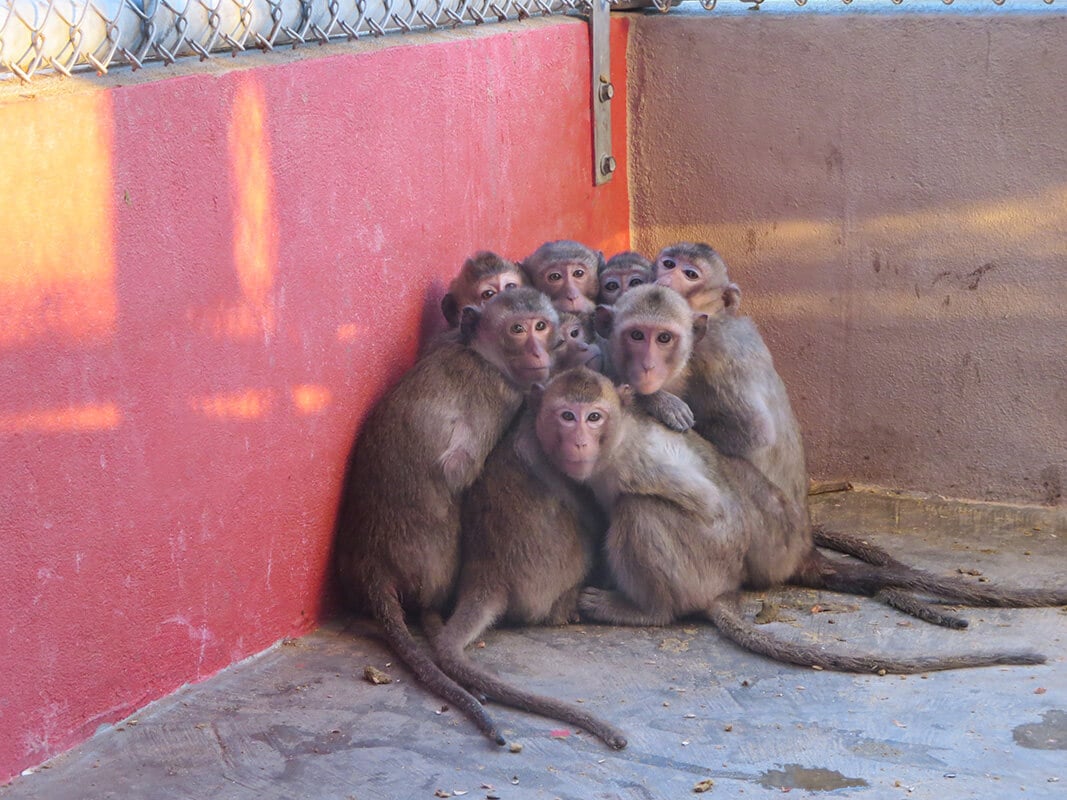
As first reported by The Associated Press, a disturbing PETA eyewitness investigation reveals that workers violently handled monkeys—terrorizing them—and systemically neglected them at Primate Products, Inc. (PPI). The notorious Hendry County, Florida, primate dealer imports, warehouses, and sells monkeys destined for experiments and has been awarded federal contracts worth more than $13 million—including by the National Institutes of Health, the Army, and the Centers for Disease Control and Prevention. PPI also sends monkeys to Charles River Laboratories International, SNBL USA, Columbia and New York universities, the University of Pittsburgh, and the University of Maryland School of Medicine, among others.
Update: A team of six U.S. Department of Agriculture (USDA) inspectors confirmed PETA’s findings, citing PPI for at least 25 violations of nine animal-welfare regulations. View the reports here and here. The USDA has opened an investigation of PPI.
Please, won’t you help these animals?
Chased, Roughly Handled, and Severely Stressed
As you can see in this shocking video footage, PPI workers chased after and grabbed terrified monkeys by their sensitive tails. They aggressively swung nets at them, yanked them off the fences that they desperately clung to, and even hurled them into nets.
Animal behaviorist Dr. Marc Bekoff, professor emeritus at the University of Colorado, Boulder, stated that these actions “cause the animals severe behavioral stress, anxiety, and fear” [emphasis added]. Veterinarian Dr. Nedim Buyukmihci, emeritus professor of veterinary medicine at the University of California-Davis, who has extensive experience caring for monkeys rescued from laboratories, added, “[T]here was the real danger of dislocating the vertebrae in the tails and even breaking off portions of the tails. Long-tailed macaques do not have prehensile tails, hence the tails cannot withstand the kind of trauma being inflicted on them by the people ….”
Workers with no formal veterinary training pushed monkeys’ internal tissues, which protruded from their anuses—possibly as a result of stress—back into their bodies. The workers held these animals upside down and then sometimes shook them. Dr. Nicholas Dodman, an animal behaviorist, veterinary anesthesiologist, and professor, wrote, “This procedure would cause the monkey fear and pain and unnecessary suffering. … This is a veterinary procedure that requires a veterinarian to be present” [emphasis added].
In Pain and Denied Adequate Care
Some monkeys with painful injuries, including exposed bones, were left to suffer for days. One monkey was denied adequate veterinary care for an exposed vertebra in her tail for at least seven days, despite the witness’s having verbally notified a supervisor, a PPI manager, and another worker repeatedly about the injury. The witness also submitted five written reports to PPI staff about the wound. Experts agree that this was an extremely painful injury and that leaving the monkey in the filth of PPI exposed her to risk of infection and even death.
Workers denied chronically ill and thin monkeys a quick, painless death. The animals instead died on their own in cages. One very thin monkey—whom workers said looked like a “crack addict” and like he “had cancer”—was only moved to PPI’s so-called “intensive care unit” after the witness found him lying motionless on the concrete floor of a pen. Five days later, the monkey “started gasping” and died. Another monkey, who was deemed “very thin” by PPI staff since at least October 2014, was put in a cage one day in March 2015. When the witness asked when a veterinarian would next be at PPI, a coworker replied, “You asking too many questions.” The monkey was found dead inside a cage two days later.
Lay workers crudely pulled sedated monkeys’ teeth out. As one monkey opened his mouth and grabbed at the unsanitized table that he had been put on, a veterinarian cut part of his tail off. Experts concurred that the monkey was not given adequate anesthetics and felt the painful cuts and that doing this was also “extremely psychologically stressful” for other monkeys who were watching from nearby.
'Living' in Fear and Denied Everything Natural and Meaningful to Them
PPI confined monkeys with other stressed and sometimes apparently incompatible pen-mates for months. The severe psychological stress of being imprisoned and given virtually nothing to do likely contributed to fights among monkeys. With no escape, subordinate monkeys probably lived in constant terror as they feared being violently handled by PPI staff or attacked by other monkeys. Dozens of reports documented that the monkeys were attacked, were held down and mounted, and had open wounds and extensive hair loss.
One monkey, named Loretta by the witness, was left penned with the monkeys who had injured and apparently terrified her for more than 22 weeks, despite at least 23 written and verbal reports to PPI staff that the monkey was being attacked and that her face was frequently lacerated; that she appeared to be afraid of the other monkeys in the enclosure; and that she had extensive hair loss.
Some monkeys were confined alone to bleak metal cages from which they were unable to touch other monkeys. Locked in isolation and denied the companionship of other monkeys, which is crucial to their mental and physical health—just as it is to ours—some of these psychologically distressed monkeys rocked back and forth and paced in circles.
Dr. Stacy Lopresti-Goodman, an associate professor of psychology at Marymount University who studies abnormal behavior and psychopathologies in primates, wrote, “[N]on-human victims of traumatic entrapment live in a chronic state of fear and anxiety, given the unpredictable schedule of abuses from their captors. This is evident in the video of the monkeys that I reviewed. These situations can often result in the development of abnormal …, stereotypic …, or self-injurious behaviors. Individuals engage in these behaviors as a way to cope with stress and anxiety.”
Caged monkeys frequently huddled in groups. Dr. Barbara J. King, chancellor professor of anthropology at the College of William and Mary, a biological anthropologist with expertise in primate behavior, and a former Guggenheim fellow, wrote, “For someone like me who has studied social behavior of monkeys in the wild, [this video is] disturbing to watch. Under normal or even semi-normal conditions, monkeys derive comfort from physical contact with each other, and typically relax in each other’s embrace. What we see here instead are monkeys who are highly anxious despite contact comfort, which points to extremely high stressors in their environment. Their limbs remain tense and their facial expressions reveal anxiety. In addition, the environment is horribly sterile and it is likely the animals were uncomfortably cold” [emphasis added].
Cold, Thirsty, Living Amid Waste and Mold, and Exposed to Caustic Bleach
Though temperatures dipped to 35°F, most monkeys kept outside were denied heat throughout the winter, leading to frostbite and apparently the death of at least one monkey in an outdoor enclosure.
Monkeys were confined to virtually barren concrete pens sometimes filled with days’ worth of accumulated waste and even, apparently, black mold. PPI’s failing water pump sometimes left monkeys shaking dispensers in search of water but to no avail.
According to Dr. Buyukmihci, the barren floors at PPI are “highly inappropriate for the welfare and well-being of these individuals. There should be an earthen floor or at least a heavily (thickly) bedded floor to provide substrate for exploration as well as to provide protection for the feet.”
At least one worker left monkeys in cages while spraying them with water—causing them to get wet and likely adding to their fear. Other workers sprayed dangerously strong industrial bleach on pens—even while monkeys were still inside them. A supervisor said that he had seen monkeys “burned by bleach.”
Seen as a Commodity to Ship Around the Globe and Use in Deadly Experiments
In 2014 alone, PPI imported 1,000 monkeys from Asia and Africa—63 percent of whom were wild-caught.
After being abducted from their families and homes on an island in the Indian Ocean or forced to breed on dismal factory farms in China, frantic monkeys are crammed into crates and endure a terrifying transatlantic journey in the cargo holds of airplanes. Sometimes they are right beneath the feet of unsuspecting passengers before ending up at facilities like PPI.
Once at PPI, workers took blood and spinal fluid from sedated monkeys—and then euthanized some of them and withdrew fluids from their eyes—to sell to laboratories. Those who survive PPI will eventually be trucked to government facilities, for-hire testing laboratories, and universities.
There, they may be intentionally infected through the rectum or vagina with an HIV-like virus that causes crippling symptoms similar to AIDS; be strapped to a Plexiglas chair and exposed to full-body radiation; have their vaginal fluids taken or part of their jaw removed; have holes drilled into their brains; be infected with West Nile virus; or be force-fed drugs and later killed.
You Can Help Stop This!
Please ask officials in Hendry County, Florida, to take action against PPI! These officials determine whether PPI is violating the county’s Land Development Code by using its land in ways inconsistent with its agricultural zoning—including by using wild and exotic animals for blood, spinal fluid, eye fluids, tissue samples, and more.
Ask Hendry County officials to find that PPI is not complying with the county’s code, deny PPI any variance or special exception, and then close it for good.

